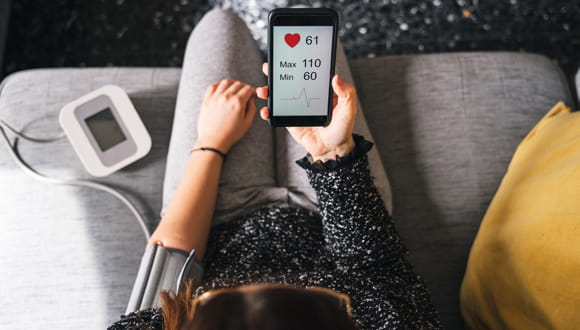Why Your Blood Pressure Matters — Even in Your 20s & 30s
July 26, 2022 - Katie McCallumYou're young, you're healthy — so does it actually matter that your doctor is concerned about your blood pressure?
Even if you're a young adult, you aren't too young to be affected by high blood pressure. In fact, almost half of adults over the age of 20 have elevated or high blood pressure — even if they appear healthy. High blood pressure doesn't cause obvious symptoms, but that doesn't mean it should be ignored.
"While it might not feel like it, high blood pressure quietly damages your body over time — increasing your risk of developing serious medical conditions," says Dr. Nasir, Chief of Cardiovascular Prevention and Wellness at Houston Methodist. "It's why we call high blood pressure the silent killer."
Plus, having high blood pressure may increase your risk of getting seriously ill with COVID-19.
What your blood pressure numbers mean
Blood pressure is the force that blood applies to the walls of arteries as it's pumped throughout the body.
"Your arteries are built to withstand some pressure, but there's a limit to what they can handle," says Dr. Nasir.
This is why blood pressure is measured and segmented based on how it affects our health. The four blood pressure categories are:
- Normal blood pressure: Lower than 120/80 mmHg
- Elevated blood pressure: Between 120-129/80 mmHg
- High blood pressure, stage 1: Between 130-139/80-90 mmHg
- High blood pressure, stage 2: 140/90 mmHg or higher
Only normal blood pressure is considered healthy. Having elevated or high blood pressure damages your heart and arteries by:
- Forcing your heart to pump harder. Over time, this causes heart muscle to thicken, making it harder for the heart to fill with and pump blood.
- Narrowing and hardening your arteries. This can limit the normal flow of blood.
How does blood pressure affect my health?
Even if you're only in your 20s or 30s, long-term studies show that having elevated blood pressure significantly increases your risk of developing serious health conditions later in life.
"Uncontrolled high blood pressure is a major risk factor for heart disease in middle age, which is the leading cause of death in the U.S.," says Dr. Nasir. "It's also a risk factor for stroke, kidney disease and several eye conditions."
Plus, high blood pressure affects more than just your health; there are financial implications, too. A person with high blood pressure spends almost $2,000 a year on the associated medications and health costs. These costs skyrocket if high blood pressure is left uncontrolled and serious medical conditions, such as heart disease, result.
How do I lower my blood pressure?
The steps to lower your blood pressure aren't as painful as you may be thinking. If you smoke, you'll need to stop. Otherwise, lowering your blood pressure is as easy as the "more of this, less of that" approach you're used to hearing about, including:
- Maintaining a healthy weight. If you're overweight, a loss of as few as 10 pounds can lower your blood pressure.
- Consuming low levels of salt. Keep your salt intake under 1,500 mg/day.
- Getting plenty of exercise. Try to exercise for at least 90 minutes every week.
- Limiting alcohol. Keep your alcohol intake to one drink per day if you're a woman, or two drinks per day if you're a man.
- Eating healthy. Aim for a diet low in saturated and trans fats and rich in fruits, vegetables and whole grains.
"Not only may young people be tempted to brush off their elevated or high blood pressure," says Dr. Nasir, "but they are less likely to be diagnosed by doctors during their office visits. Apart from taking steps now to reduce risk factors down the road, its important to discuss with your doctor if your blood pressure is consistently high."








